Ever taken a bite of your favorite food only to feel that sudden sting or soreness on the roof of your mouth? It’s annoying, right? You start wondering if it’s something serious or just a small burn that’ll go away on its own. If you’ve ever caught yourself thinking, Why does the roof of my mouth hurt when I eat?, you’re definitely not alone.
In this post, we’ll break down all the possible reasons behind that pain, from simple burns and mouth sores to allergies or dental issues, and what you can do to fix it. You’ll learn how to spot when it’s harmless and when it might be time to see a dentist or doctor. Let’s make sense of that discomfort so you can eat, talk, and smile without pain again.
1. Mouth (Canker) Sores
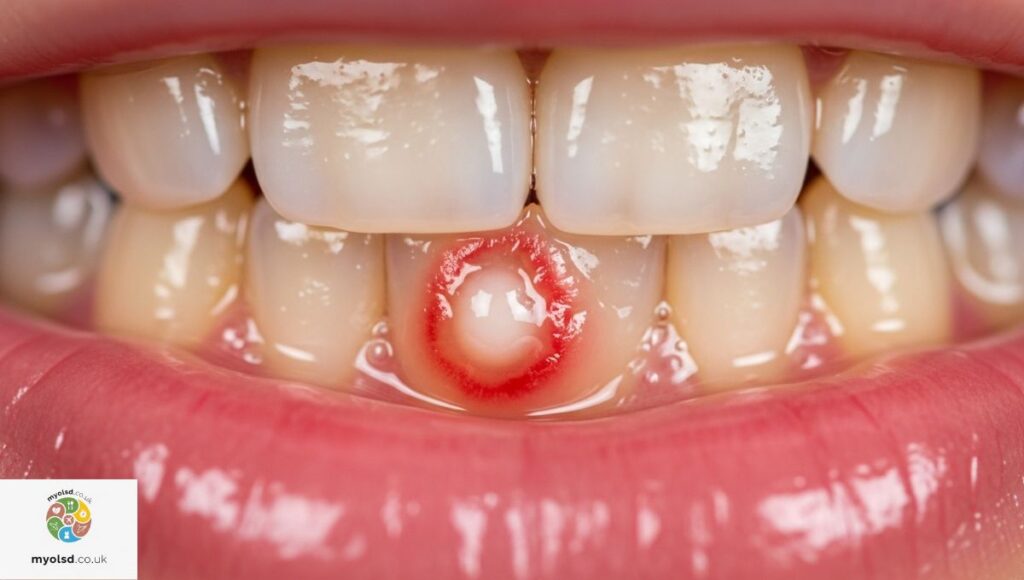
Canker sores are one of the most common reasons the roof of your mouth might hurt when you eat. These small, round ulcers can form on the soft tissue inside your mouth, including the hard or soft palate. You might notice a white or yellow center with a red border, and eating acidic or spicy foods can make them sting badly.
While the exact cause isn’t always clear, canker sores are often linked to stress, minor injuries, vitamin B12 or folate deficiency, and hormonal changes. They usually heal on their own within a week or two. To ease the pain, rinse your mouth with a mild saltwater solution or use an over-the-counter numbing gel like benzocaine.
2. Cold Sores (Fever Blisters)
Cold sores, or fever blisters, are caused by the herpes simplex virus (HSV-1). They usually appear outside the mouth, but sometimes the blisters can spread inside, including on the roof of your mouth. These fluid-filled bumps can cause sharp, burning pain while eating or drinking.
If you notice tingling or itching before a sore appears, that’s an early sign. Antiviral medications like Abreva or prescription treatments can help speed up healing and reduce pain. Avoid kissing, sharing utensils, or touching the sores to prevent spreading the infection.
3. Mouth Burns
One of the most common causes of roof-of-mouth pain is a burn from hot food or drinks. That piping hot slice of pizza, a fresh cup of coffee, or hot soup can easily scald the delicate tissues of your hard palate.
A mild (first-degree) burn will usually cause redness and soreness that heals within a few days. But a severe burn might cause blistering or swelling and require medical attention. To soothe a mild burn, sip cold milk, eat soft foods like yogurt or ice cream, and rinse with lukewarm salt water twice a day. Avoid spicy or acidic foods while your mouth heals.
4. Mouth Cuts (Trauma)
Crunchy chips, sharp edges of toast, or even accidentally biting the inside of your mouth can cause small cuts or scrapes on the roof of your mouth. These tiny wounds can be surprisingly painful, especially when you eat salty or hot foods.
The best way to treat a minor mouth injury is to keep the area clean and avoid irritation. Rinse with warm saltwater, avoid rough or crunchy foods, and let your mouth’s natural healing process do the rest. Most small cuts heal in three to seven days.
Read more Article: Do Your Eyelashes Grow When You Cry?
5. Oral Thrush
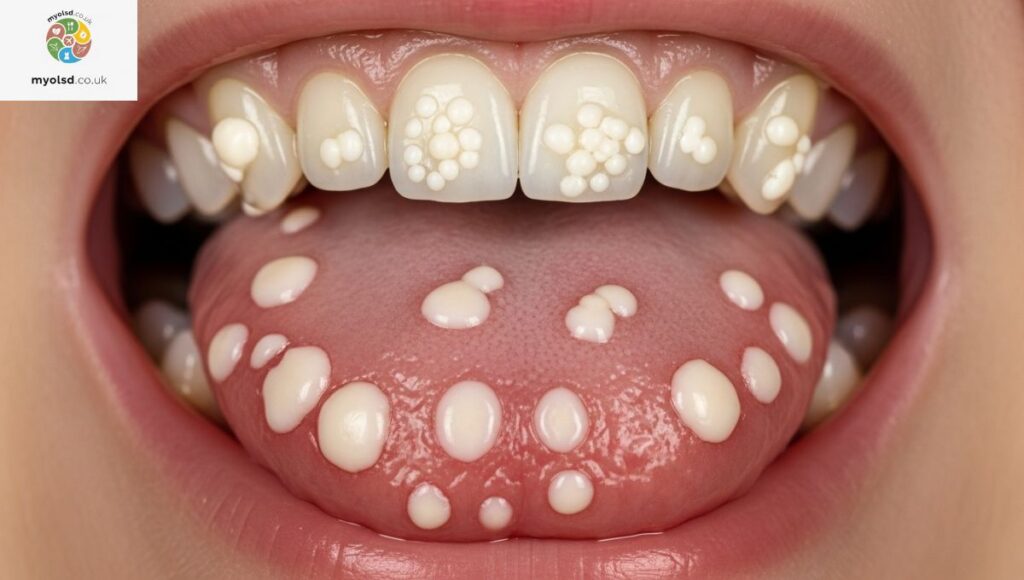
If your roof of mouth pain feels more like a burning sensation and you notice white patches, it might be oral thrush, a yeast infection caused by Candida albicans. This condition is more common if you use inhalers, take antibiotics, or have diabetes.
Thrush can make eating uncomfortable and cause a metallic taste in your mouth. Antifungal treatments like Diflucan or medicated mouthwashes can help clear it up. Keeping your mouth clean and staying hydrated also helps prevent recurrence.
6. Squamous Papilloma (Warts)
Sometimes, a small wart-like bump called squamous papilloma can form on the roof of your mouth. It’s usually caused by the HPV virus and isn’t painful, but if irritated by food or dental appliances, it can cause discomfort while eating.
Treatment may involve cryotherapy, laser therapy, or surgical removal, depending on the size and location. While most are benign, it’s best to have your dentist check any unusual growth in your mouth.
What Other Symptoms Can You Feel Besides Pain and Soreness?
Besides pain, you might experience redness, swelling, or small blisters on the roof of your mouth. Some people also notice numbness, burning, or a tingling sensation. Infections can cause white or yellow patches, while allergic reactions might lead to itching or a feeling of tightness in the throat.
If you have persistent soreness, difficulty swallowing, or bleeding, these could be signs of a more serious condition that requires medical evaluation.
What Does a Normal Roof of the Mouth Look Like?
A healthy palate should appear smooth, pink, and moist. The hard palate (front part) is firm and bony, while the soft palate (back part) is more flexible. Any major color changes, lumps, or patches, such as white, red, or yellow spots, may indicate infection, irritation, or other underlying issues that need attention.
What Treatments Are There for Pain in the Roof of the Mouth?
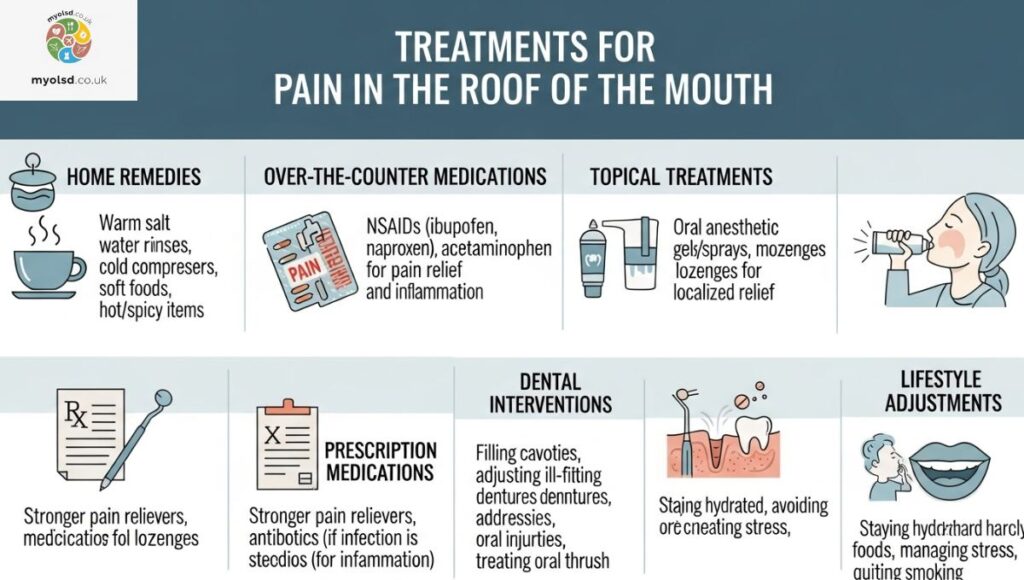
Treatment depends on the cause. For minor injuries or burns, simple at-home remedies like cool liquids, soft foods, and saltwater rinses usually help. If your pain is due to infection or ulcers, OTC medications like ibuprofen, acetaminophen, or medicated mouthwashes can reduce inflammation and discomfort.
For conditions like oral thrush or cold sores, specific antifungal or antiviral medicines are needed. Always consult a healthcare professional if pain persists for more than a week or worsens over time.
Which Home Remedies Help Ease Roof-of-the-Mouth Pain?
You can soothe mouth pain with natural, gentle remedies that encourage healing. Try these options:
- Saltwater rinse: Mix 1 teaspoon of salt in 1 cup of warm water and rinse twice a day.
- Cool milk or yogurt: These coat and calm the irritated tissue.
- Soft foods diet: Stick to smoothies, soups, and mashed foods.
- Aloe vera gel or chamomile rinse: Both have soothing and anti-inflammatory properties.
- Avoid irritants: Skip spicy, acidic, or crunchy foods until healed.
These remedies not only relieve discomfort but also help prevent secondary infections.
When Should You See a Doctor for Pain in the Roof of Your Mouth?
You should contact a doctor or dentist if:
- The pain lasts longer than seven days
- You notice blisters, pus, or bleeding
- You have a fever, a sore throat, or swollen lymph nodes
- Eating or swallowing becomes difficult
- You see white or yellow patches that don’t go away
Persistent pain could point to conditions like burning mouth syndrome, vitamin deficiencies, or even oral cancer, so don’t ignore it.
Burns from Hot Foods and Drinks
Hot pizza cheese or fresh coffee are frequent culprits behind a burned roof of the mouth. The delicate oral tissue is sensitive to heat, and burns can happen in seconds.
For mild burns, try cool drinks, cold compresses, or soft foods like applesauce and ice pops. Avoid alcohol, tobacco, and spicy food. Severe burns may need medical care, especially if blisters form or the pain doesn’t improve in a few days.
Read more Article: Do Your Eyelashes Grow When You Cry?
Cuts or Scrapes from Hard, Crunchy Foods
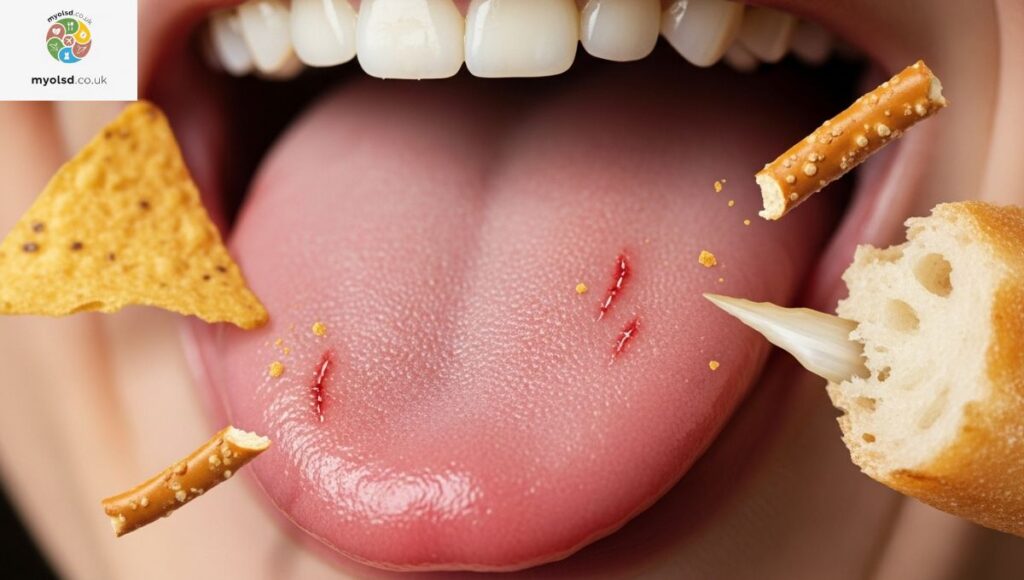
Chips, crusty bread, and nuts can all cause tiny abrasions inside your mouth. These often heal quickly, but if the area becomes red, swollen, or infected, it may need extra care.
To heal faster, rinse gently with warm salt water and stick to soft, soothing foods like soup, oatmeal, or mashed potatoes. Avoid touching the wound or using mouthwashes with alcohol.
Oral Infections (Often Viral)
Viral infections like HSV-1, mononucleosis, or hand, foot, and mouth disease can cause sores or red spots on the palate. Bacterial infections, such as strep throat, can also spread to the roof of your mouth and cause pain.
If infection symptoms include fever, pus, or sore throat, you’ll likely need medical treatment such as antibiotics or antivirals.
Dental Issues, Like Abscesses or Gum Disease
Sometimes, the pain you feel on the roof of your mouth isn’t from the palate itself but from dental problems like an abscessed tooth or gum inflammation. Infections can radiate pain upward, making it feel like the roof of your mouth hurts when you eat.
A dental checkup can reveal hidden causes like tooth decay, gum disease, or sinus pressure. Treating these issues promptly prevents the spread of infection.
Allergic Reactions or Food Sensitivities
Certain foods, especially nuts, shellfish, acidic fruits, or preservatives, can cause allergic reactions in the mouth. Symptoms include swelling, tingling, or a burning sensation on the roof of your mouth.
If you experience throat tightness or lip swelling, seek medical help immediately. For mild cases, antihistamines and avoiding trigger foods usually solve the problem.
When Should You See a Dentist for Roof of Mouth Pain?
See a dentist if pain persists beyond a week, or if you suspect dental irritation, gum disease, or infection. A professional oral examination can detect early signs of leukoplakia, oral cancer, or nerve-related pain.
Routine dental visits also help maintain oral hygiene and prevent conditions that might lead to roof-of-mouth discomfort in the future.
Ways to Soothe Roof of Mouth Pain
Here are a few proven ways to find quick relief:
- Rinse Gently with Warm Salt Water – It reduces bacteria and inflammation.
- Choose Soothing, Soft Foods – Yogurt, smoothies, or oatmeal help protect the healing tissue.
- Avoid Foods That Can Irritate – Skip spicy, hot, or acidic meals.
- Stay Hydrated – Dry mouth can worsen soreness.
- Use OTC Pain Relievers – Medications like ibuprofen or acetaminophen ease pain and swelling.
Don’t Ignore Persistent Roof of Mouth Pain
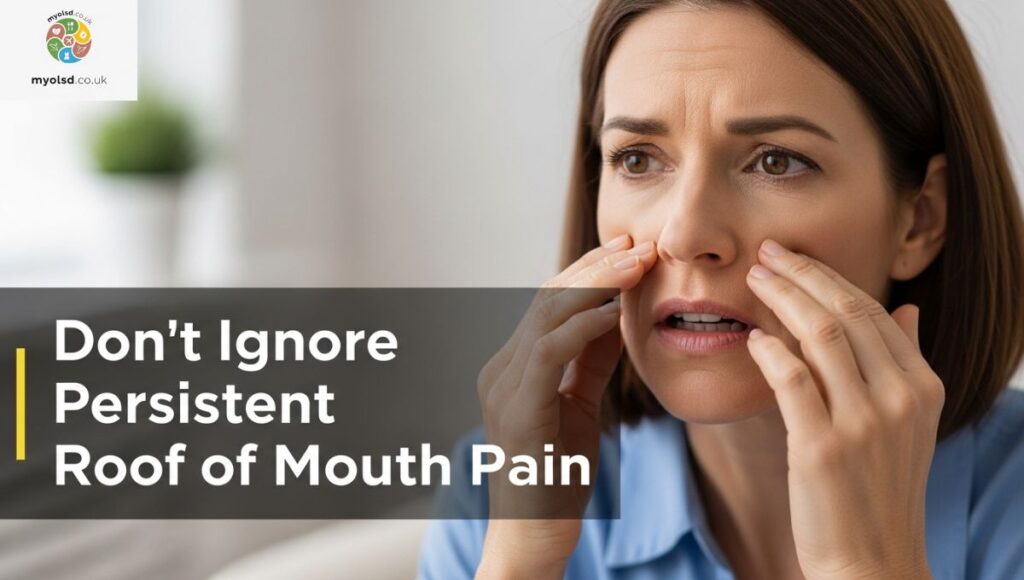
A sore or burning roof of the mouth might seem minor, but if it keeps returning or doesn’t heal, it could indicate an underlying issue. Continuous irritation or pain while eating should never be ignored, especially if you notice swelling, bleeding, or unusual patches.
See a doctor or dentist for proper diagnosis and treatment. Early care ensures faster recovery and protects your oral health long-term.
The Bottom Line
If you’ve been wondering, Why does the roof of my mouth hurt when I eat?, the answer could be as simple as a mild burn or as complex as an infection or nutritional deficiency. Thankfully, most causes are mild and easily treatable at home with gentle care, hydration, and proper oral hygiene.
But if your discomfort persists or worsens, don’t wait. Seek medical attention to rule out more serious conditions. A healthy, pain-free mouth not only makes eating enjoyable again but also keeps your entire body healthier.
FAQs
1. When should I worry about roof of mouth pain?
If the pain lasts more than a week, keeps getting worse, or comes with swelling, bleeding, or white patches, it’s best to see a dentist or doctor. Persistent pain could mean an infection or another underlying condition.
2. What deficiency causes a sore roof of the mouth?
A sore roof of the mouth can be linked to deficiencies in vitamin B12, folate, or iron, which affect the health of your mouth’s tissues and healing ability.
3. How do you feel if your B12 is low?
Low B12 can make you feel tired, weak, or dizzy. In the mouth, it may cause soreness, a burning tongue, or frequent mouth ulcers.
4. Can a lack of iron cause mouth ulcers?
Yes, low iron levels can lead to mouth ulcers and general oral soreness because your body struggles to repair the delicate lining inside your mouth.
5. Can vitamin D deficiency cause mouth ulcers?
Yes, vitamin D helps your immune system and cell repair. A deficiency may increase your risk of recurring mouth ulcers or slow down healing.
6. What virus causes mouth sores in adults?
The herpes simplex virus (HSV-1) is the most common cause of mouth sores in adults, often appearing as cold sores or blisters inside or around the mouth.
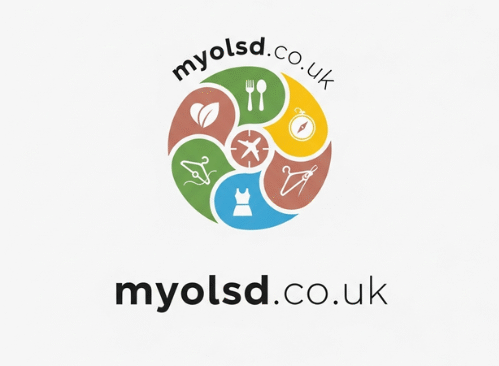
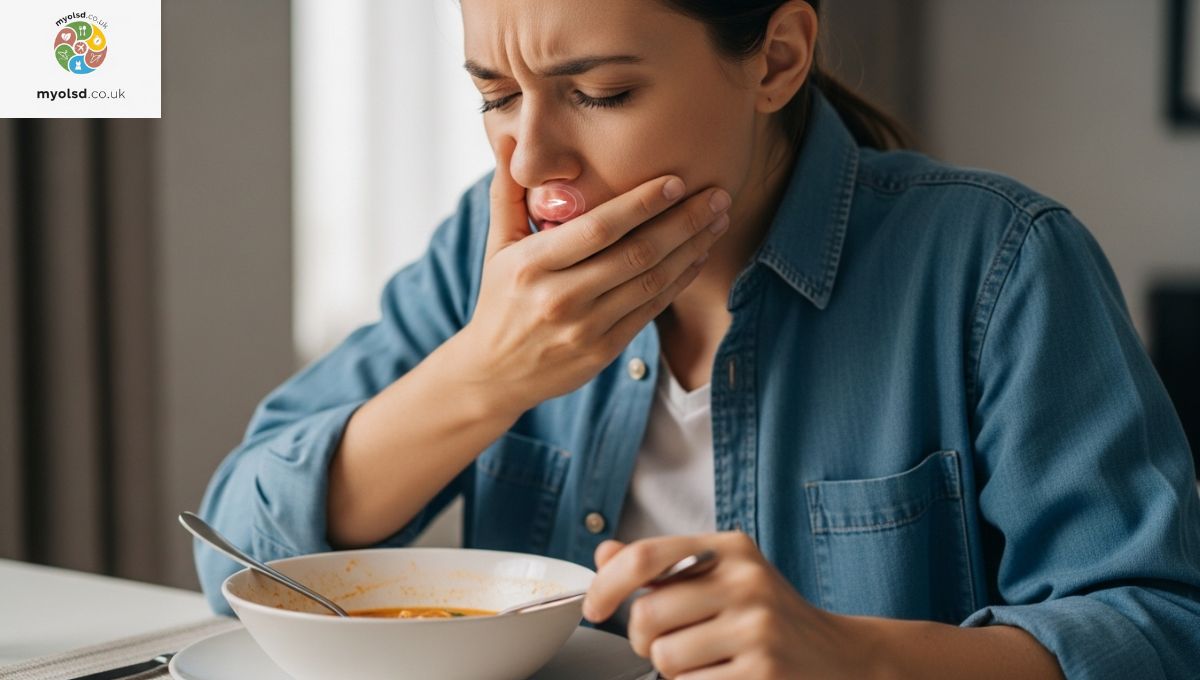
7u911m